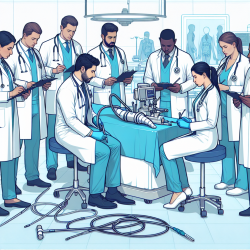Improving ERCP Skills: Embracing Stricter Credentialing Standards
Endoscopic Retrograde Cholangiopancreatography (ERCP) is a crucial yet complex procedure used to diagnose and treat conditions related to the biliary and pancreatic ducts. Despite its importance, ERCP presents a steep learning curve and carries significant risks, necessitating stringent credentialing standards to ensure practitioner competency and patient safety.
The Need for National Standards
According to the research article "Stricter national standards are required for credentialing of endoscopic-retrograde-cholangiopancreatography in the United States," there is a compelling need for mandatory, quantitative criteria for ERCP credentialing. The current system, often managed by hospital committees, is susceptible to political pressures, leading to inconsistencies in the credentialing process. This has resulted in practitioners performing ERCPs with inadequate training, potentially leading to poor patient outcomes.
Key Recommendations for Practitioners
- Enhanced Training: Practitioners should seek additional training beyond the standard three-year GI fellowship. An optional year of advanced endoscopy training, focusing on ERCP, is highly recommended.
- Volume and Success Rates: Achieving competency should be based on performing a minimum of 200-250 ERCPs with a success rate of approximately 90% for duct cannulation.
- Independent Oversight: Credentialing should ideally be overseen by an independent national entity, such as the National Board of Medical Examiners, to prevent local political influences.
Encouraging Further Research
Practitioners are encouraged to engage in ongoing research to stay abreast of advancements in ERCP techniques and credentialing standards. Participation in workshops, conferences, and webinars can provide valuable insights and enhance technical skills.
Conclusion
Implementing stricter national standards for ERCP credentialing is essential to ensure high-quality patient care and practitioner competency. By adhering to these standards and engaging in continuous professional development, practitioners can significantly improve their ERCP skills and patient outcomes.
To read the original research paper, please follow this link: Stricter national standards are required for credentialing of endoscopic-retrograde-cholangiopancreatography in the United States.










